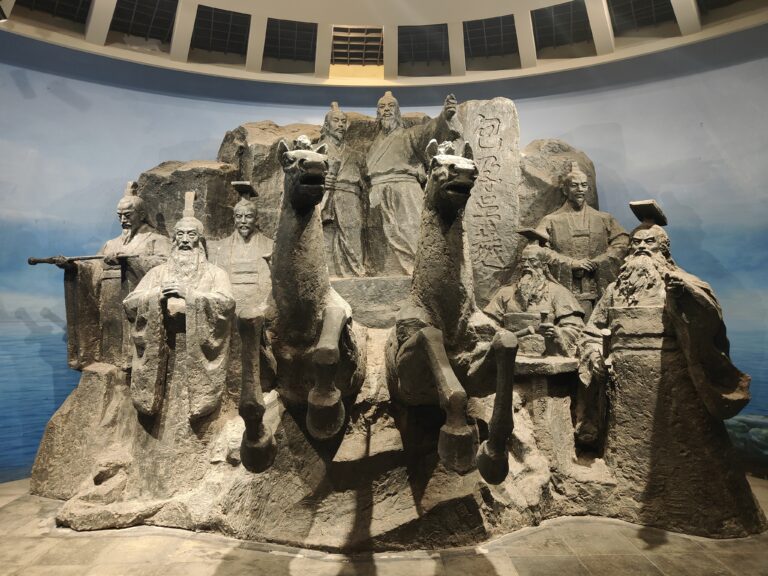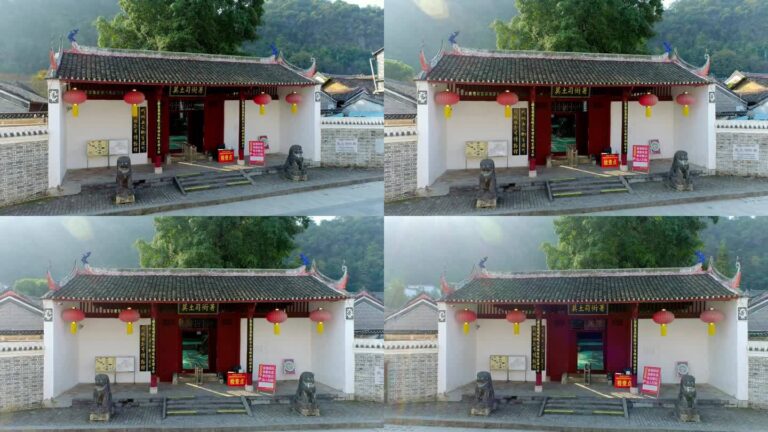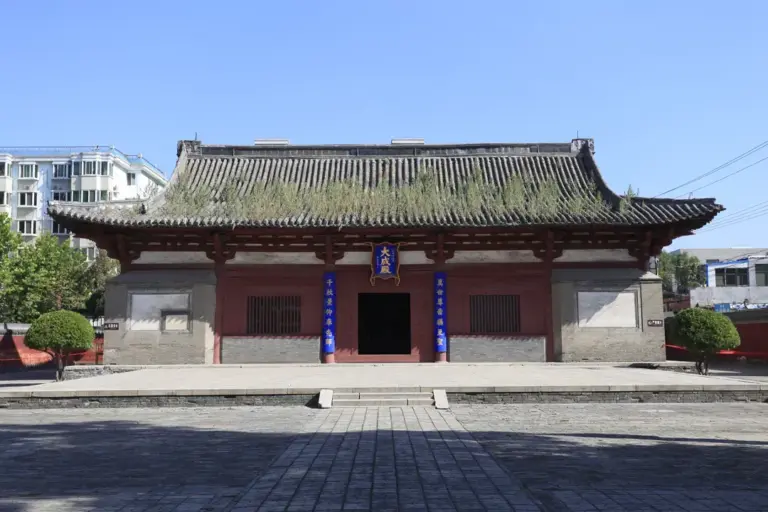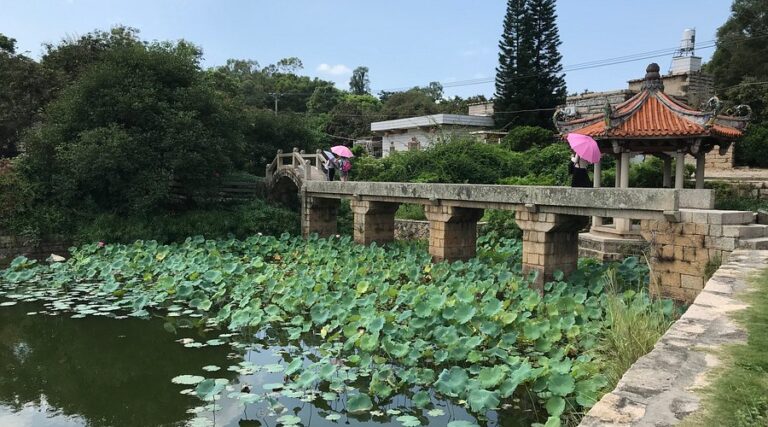Experience the Spiritual Serenity of Dali Zhoucheng Wenmiao He Wumiao in Yunnan
An Essential Guide to Visiting Dali Zhoucheng Wenmiao He Wumiao
In This Guide
- An Essential Guide to Visiting Dali Zhoucheng Wenmiao He Wumiao
- The Rich History of Dali Zhoucheng Wenmiao He Wumiao
- Main Highlights: What to See at Dali Zhoucheng Wenmiao He Wumiao
- Planning Your Visit: A Practical Guide
- Tickets, Hours, and Booking
- How to Get There
- Local Cuisine and Accommodation
- Frequently Asked Questions
- Final Thoughts on Your Trip
Nestled in the picturesque landscape of Yunnan Province, the Dali Zhoucheng Wenmiao and Wumiao, or the Confucian and Martial Temples of Zhoucheng, stand as a testament to the region’s rich cultural tapestry. These temples, located in the historic town of Zhoucheng, are more than just architectural marvels; they embody the philosophical depths of Confucianism and the martial spirit that has shaped Chinese history for centuries.
Dali itself is a treasure trove of history, once serving as the capital of the Nanzhao Kingdom during the Tang Dynasty and later the Dali Kingdom in the Song Dynasty. Today, it is celebrated for its stunning natural beauty, with the majestic Cangshan Mountain flanking one side and the serene Erhai Lake on the other. Visitors to the area are often enchanted by the harmonious blend of ancient traditions and modern life, making Dali a must-visit destination for travelers seeking both adventure and tranquility.
The Wenmiao, dedicated to Confucius, is a serene space for reflection and learning, adorned with traditional Chinese architecture and intricate carvings that narrate the tales of wisdom and virtue. Meanwhile, the Wumiao, dedicated to martial deities, showcases the valor and honor associated with martial arts and history. Together, these temples not only serve as places of worship but also as cultural hubs where locals and visitors alike can engage in the timeless values of loyalty, bravery, and education.
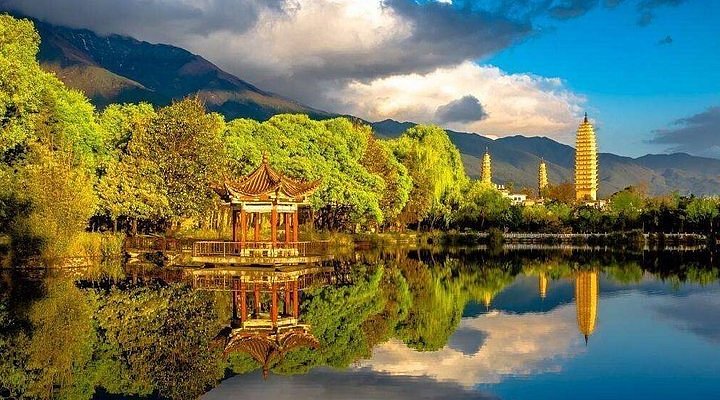
Dali Zhoucheng Wenmiao He Wumiao.
As you step into the grounds of Dali Zhoucheng Wenmiao and Wumiao, prepare to be transported back in time. The tranquil ambiance, punctuated by the sounds of rustling leaves and distant chants, invites you to immerse yourself in the profound heritage of this enchanting region. Whether you are a history buff, a cultural enthusiast, or simply in search of a peaceful retreat, these temples offer an unforgettable glimpse into the soul of Dali.
The Rich History of Dali Zhoucheng Wenmiao He Wumiao
Dali Zhoucheng Wenmiao and Wumiao, located in the picturesque Dali Bai Autonomous Prefecture, are two significant cultural landmarks that embody the rich history and heritage of this ancient region. Dali, often referred to as a “literary and cultural capital,” has a storied past that dates back over a thousand years, serving as the capital of the Nanzhao Kingdom during the Tang Dynasty and later the Dali Kingdom in the Song Dynasty.
The Wenmiao, or Confucian Temple, is dedicated to Confucius, the revered Chinese philosopher whose teachings have profoundly influenced Chinese culture and education. This temple reflects the Confucian values that have been foundational in shaping the moral and ethical framework of Chinese society. Originally built in the early Ming Dynasty, the Wenmiao has undergone several renovations over the centuries, showcasing exquisite traditional architecture and intricate carvings that highlight the artistry of the era.
Adjacent to the Wenmiao is the Wumiao, or the Military Temple, which honors military figures and celebrates the valor and contributions of those who served in defense of the realm. This temple serves as a reminder of the importance of military prowess in ancient Chinese society and its intertwining with cultural and spiritual practices. The Wumiao’s architecture features a blend of local styles, showcasing the unique artistic traditions of the Bai ethnic group.
Together, these temples not only serve as places of worship and reflection but also as historical relics that narrate the story of Dali through the ages. They stand as monuments to the region’s commitment to education, ethics, and valor, making them essential stops for those wishing to understand the historical context of Dali and its influence on Chinese culture.
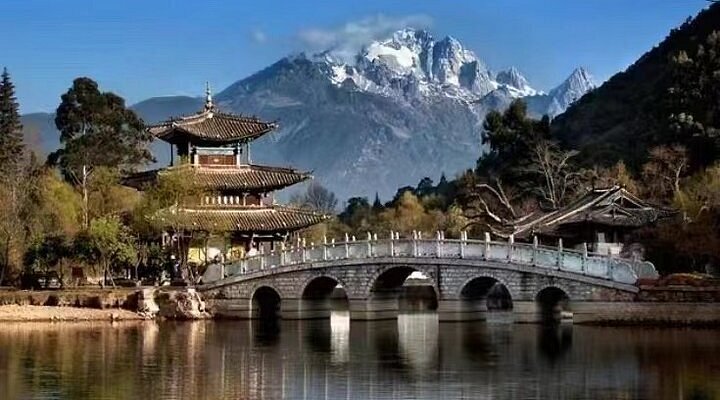
Dali Zhoucheng Wenmiao He Wumiao.
Visitors to Dali Zhoucheng Wenmiao and Wumiao can immerse themselves in the tranquil atmosphere, explore the lush gardens surrounding the temples, and appreciate the harmonious blend of history and spirituality that these sites offer. As you stroll through the grounds, you can almost feel the echoes of past scholars and warriors, their stories woven into the very fabric of these remarkable structures.
Main Highlights: What to See at Dali Zhoucheng Wenmiao He Wumiao
Dali Zhoucheng Wenmiao He Wumiao, also known as the Confucian Temple and the Martial Temple of Zhoucheng, offers a captivating glimpse into the rich cultural and historical tapestry of the Dali region in Yunnan, China. Nestled in the charming town of Zhoucheng, this site stands as a testament to the area’s deep-rooted traditions and architectural marvels.
Visitors will be enchanted by the serene atmosphere that envelops these temples, which are dedicated to Confucianism and martial arts, respectively. The Confucian Temple, with its intricate carvings and classical Chinese architecture, serves as a place of worship and reflection, celebrating the teachings of Confucius. The Martial Temple complements this with its focus on valor and the martial arts heritage, showcasing the importance of strength and discipline in local culture.
One of the highlights is the beautifully landscaped courtyards that invite visitors to stroll and absorb the tranquil ambiance. The temples are adorned with vibrant murals and historical artifacts that narrate the stories of the past, making it an educational experience as well as a spiritual one.
As you explore the area, don’t miss the opportunity to engage with local artisans and their crafts, which often reflect the themes of the temples. The surrounding village is also rich in Bai ethnic culture, known for its distinctive architectural style and warm hospitality. This adds another layer of charm to your visit, allowing for a deeper understanding of the local customs and lifestyles.
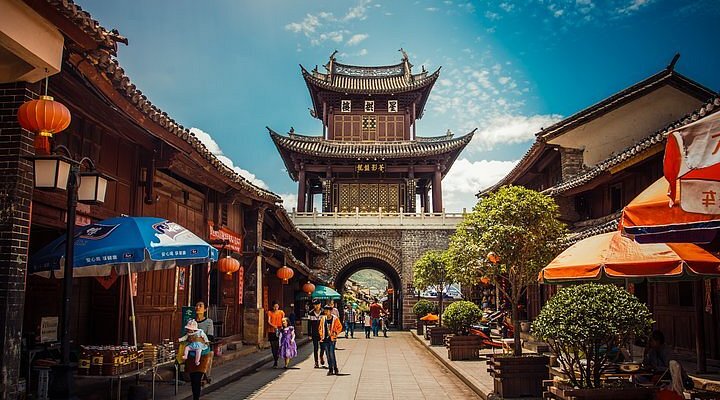
Dali Zhoucheng Wenmiao He Wumiao.
Accessibility is convenient, and the temples are open to visitors year-round, making it a fantastic addition to any itinerary in Dali. Whether you’re seeking spiritual enlightenment, cultural enrichment, or simply a peaceful place to reflect, Dali Zhoucheng Wenmiao He Wumiao is a must-visit destination that encapsulates the essence of this beautiful region.
Planning Your Visit: A Practical Guide
When planning your visit to Dali’s Zhoucheng Confucian Temple and Wu Temple, it’s essential to be equipped with the right information to make the most of your experience. Here’s a practical guide to help you navigate your visit smoothly.
Location and Accessibility
Zhoucheng Confucian Temple (文庙) and Wu Temple (武庙) are located in Zhoucheng Town, which is part of Dali Bai Autonomous Prefecture in Yunnan Province. The temples are easily accessible by public transport, taxis, or rental vehicles. If you’re coming from Dali City, it’s about a 30-minute drive, making it a convenient day trip option.
Opening Hours and Tickets
As of 2025, it’s advisable to confirm the specific opening hours directly before your visit, as they may vary seasonally or due to special events. Generally, these temples are open throughout the week, allowing visitors to explore at their convenience. Entrance fees are typically modest, and online booking options may be available, so check local resources or travel websites for the latest information regarding prices and reservation procedures.
What to Expect
-
Cultural Significance: The Confucian Temple is dedicated to Confucius, serving as a site for educational and cultural activities, while the Wu Temple honors military figures. Both temples reflect traditional Chinese architecture and cultural history, making them fascinating places to learn about local customs and heritage.
-
Architectural Beauty: Admire the intricate carvings and the serene environment surrounding the temples. The structures feature traditional Bai architectural styles, characterized by elegant roofs and detailed decorations, set against the backdrop of the beautiful Dali landscape.
-
Photography Opportunities: The temples are surrounded by picturesque views, providing excellent opportunities for photography. Be sure to take your camera to capture the stunning architecture and natural scenery.
-
Events and Activities: Depending on the time of your visit, you may find cultural performances or educational events taking place. These can enhance your experience and provide deeper insights into the local culture.
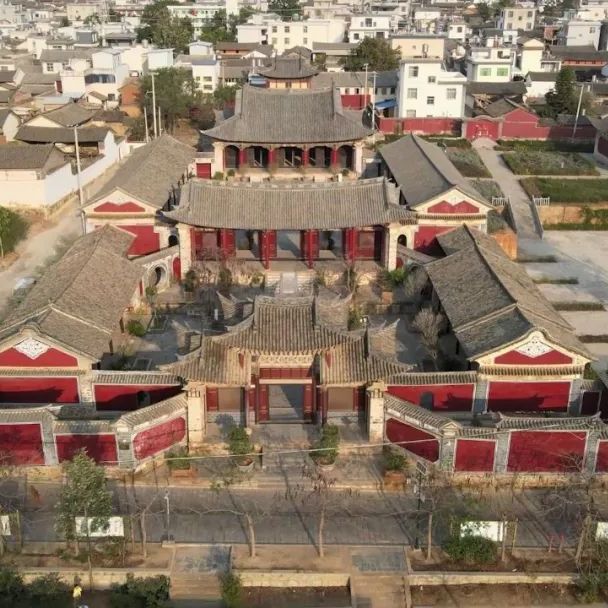
Dali Zhoucheng Wenmiao He Wumiao.
Nearby Attractions
While visiting the temples, consider exploring other nearby attractions:
- Dali Ancient Town: Just a short drive away, this historic town offers charming streets, shops, and restaurants, ideal for soaking in the local atmosphere.
- Erhai Lake: A scenic area perfect for cycling, walking, or taking a boat ride, providing breathtaking views of the mountains and the water.
- Cangshan Mountain: For those looking for outdoor adventures, hiking opportunities abound in this stunning mountain range.
Practical Tips
- Dress Code: Wear comfortable shoes, as there may be some walking involved. While casual attire is generally acceptable, consider dressing respectfully given the cultural significance of the sites.
- Language: While some signage may be in English, having a translation app or a phrasebook can enhance your experience and help you communicate with local residents.
- Weather Considerations: Dali has a mild climate, but temperatures can vary. Check the weather forecast and dress in layers to stay comfortable throughout your visit.
Conclusion
Visiting the Zhoucheng Confucian Temple and Wu Temple offers a unique glimpse into the cultural heart of Dali. With its rich history, stunning architecture, and beautiful surroundings, it’s a must-see for anyone traveling in this enchanting region of Yunnan. Plan ahead, and immerse yourself in the experience!
Tickets, Hours, and Booking
When planning your visit to Dali Zhoucheng Wenmiao and Wumiao, it’s important to know about the ticketing details to ensure a smooth experience.
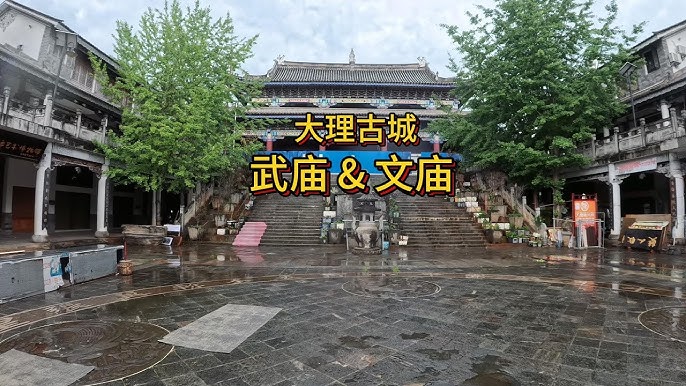
Dali Zhoucheng Wenmiao He Wumiao.
As of 2025, the entrance fees for these historic temples are reasonably priced, making them accessible for a wide range of visitors. Tickets can be purchased on-site, and it’s advisable to check for any updates or changes in pricing before your visit since prices may vary seasonally or due to special events.
Opening hours for the temples also vary, so it’s a good idea to confirm the specific times of operation prior to your visit. Generally, these sites are open throughout the day, allowing you to explore at your convenience.
For those looking to avoid crowds, consider visiting during weekdays or early in the morning. This will enhance your experience as you take in the serene atmosphere and beautiful architecture without the hustle and bustle of larger tourist groups.
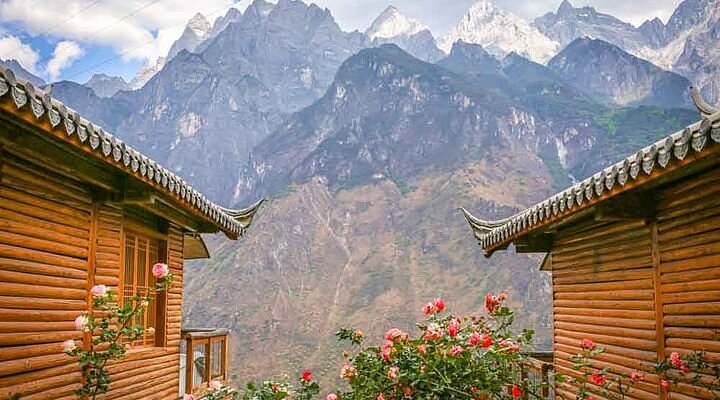
Dali Zhoucheng Wenmiao He Wumiao.
Lastly, if you’re traveling in a group or planning a guided tour, inquire about any group discounts or package deals that may be available. This can help to make your visit not only enjoyable but also cost-effective.
Be sure to plan ahead, check the weather for the day of your visit, and immerse yourself in the rich culture and history that Dali Zhoucheng Wenmiao and Wumiao have to offer!
How to Get There
When planning your visit to Dali Zhoucheng Wenmiao He Wumiao (the Confucian Temple and the Wu Temple), understanding the transportation options available will help enhance your experience. Located in the picturesque Dali Bai Autonomous Prefecture of Yunnan Province, these temples are easily accessible from various points of interest in the region.
Getting to Dali
By Air:
The nearest airport is Dali Airport (DLU), located approximately 30 kilometers from Dali town. Regular flights connect Dali to major cities like Beijing, Shanghai, and Kunming. Once you arrive, you can take a taxi or a shuttle bus to Dali town, which takes about 45 minutes.
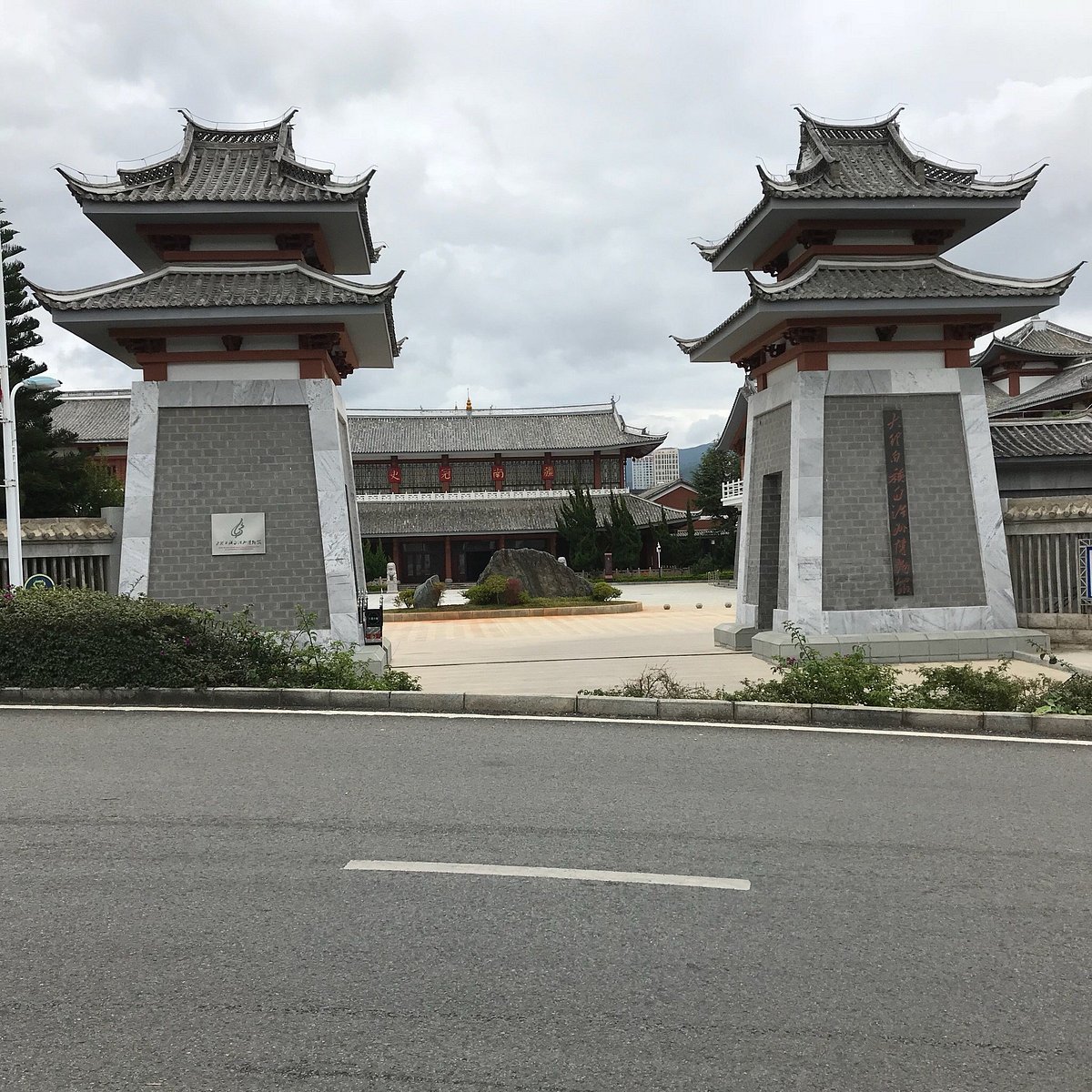
Dali Zhoucheng Wenmiao He Wumiao.
By Train:
Dali is well-connected by train, with high-speed rail services from Kunming (approximately two hours). The Dali Railway Station is centrally located, making it convenient to access local transportation options from there.
By Bus:
Long-distance buses also operate from various cities in Yunnan, including Lijiang and Kunming. Buses to Dali usually arrive at the main bus station in town, from where you can easily find local transportation to your destination.
Local Transportation in Dali
Public Buses:
Dali has an efficient public bus system that connects the town with surrounding areas, including the temples. Bus routes are affordable, with tickets generally costing around 1-2 RMB. Keep an eye out for bus No. 8, which is one of the most popular routes for tourists, connecting Dali Old Town with key attractions.
Taxis and Rideshares:
Taxis are plentiful and relatively inexpensive. Rideshare apps like Didi are also available in Dali, offering convenient options for those who prefer app-based transportation. Ensure that you have your destination written in Chinese, as some drivers may not speak English.
Bicycles and Scooters:
Renting a bicycle or electric scooter is a fantastic way to explore the scenic landscapes around Dali and its temples. Many rental shops are available in town, providing both traditional bicycles and electric models. This option allows for a leisurely exploration of the area, giving you the flexibility to stop and take in the stunning views.
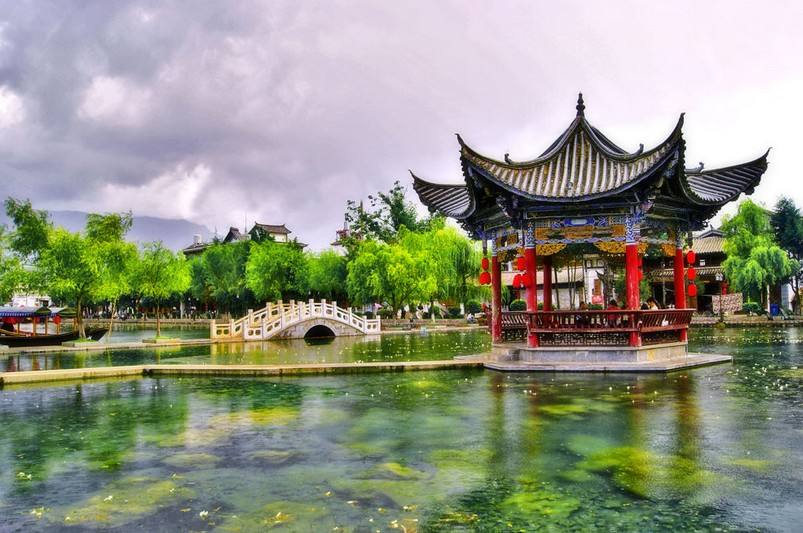
Dali Zhoucheng Wenmiao He Wumiao.
Walking:
If you’re staying in Dali Old Town, the temples are within a comfortable walking distance. The area is pedestrian-friendly, with lovely streets to explore along the way. Strolling through the local markets and enjoying the vibrant atmosphere can be an enriching experience.
Getting to the Temples
Once in Dali town, reaching the Confucian Temple and the Wu Temple in Zhoucheng is straightforward. You can take a local bus to Zhoucheng, a small town about 10 kilometers from Dali. Alternatively, hiring a taxi or taking a rideshare will provide a direct and hassle-free route to the temples.
Tips for Travelers
- Language Barrier: While some locals may speak basic English, it’s advisable to have key phrases or your destination written in Chinese to facilitate communication.
- Plan Ahead: During peak travel seasons, transportation options may become crowded, so consider booking your train or flight in advance.
- Cash is King: While many places accept mobile payments, having some cash on hand for small purchases and local transportation can be beneficial.
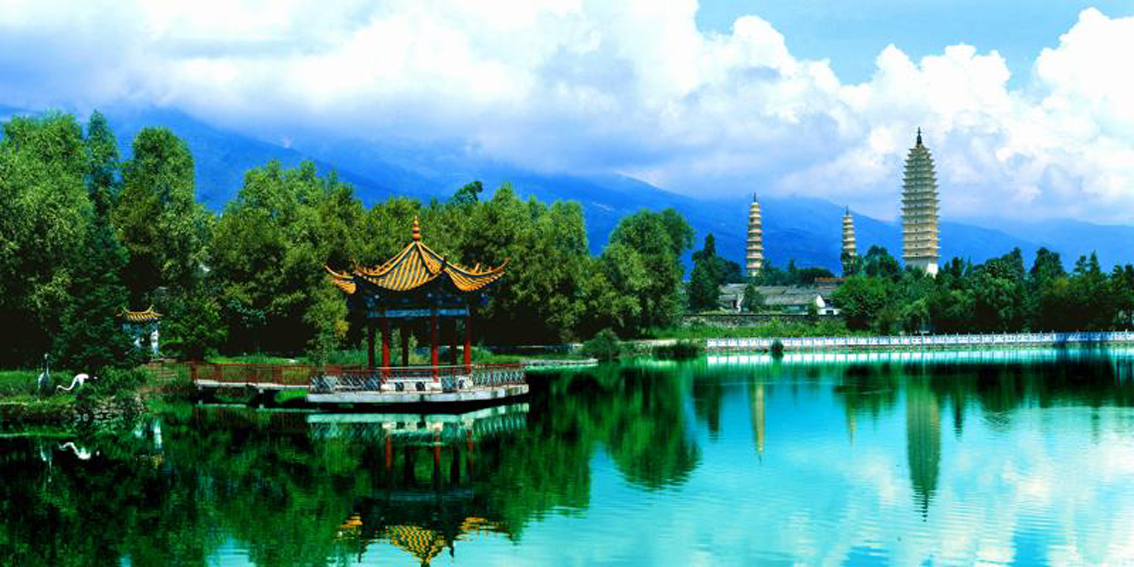
Dali Zhoucheng Wenmiao He Wumiao.
With this guide, navigating the transportation in and around Dali will be a breeze, allowing you to focus on enjoying the beauty and cultural richness of the Dali Zhoucheng Wenmiao He Wumiao. Safe travels!
Local Cuisine and Accommodation
When visiting Dali Zhoucheng Wenmiao and Wumiao, travelers can immerse themselves not only in the rich history and culture of the area but also in its vibrant culinary scene and cozy accommodations.
Culinary Delights
Dali is renowned for its unique Yunnan cuisine, characterized by its fresh ingredients and diverse flavors. Here are some must-try dishes and restaurants to enhance your culinary journey:
-
Crossing-the-Bridge Rice Noodles (过桥米线): This iconic dish features rice noodles served with a variety of fresh ingredients and a rich broth. Wang’s Crossing-the-Bridge Rice Noodles offers a delightful experience where you can customize your bowl with local ingredients.
-
Local Mushroom Hotpot (菌菇火锅): Yunnan is famous for its wild mushrooms, and trying a mushroom hotpot is a must. Restaurants like Mushroom Paradise serve a variety of mushrooms cooked in a flavorful broth, perfect for warming up during cooler nights.
-
Baked Pastry (破酥包): A local favorite, these flaky pastries can be found at numerous street stalls. Head to Xizhou Town and enjoy freshly baked pastries, often filled with savory or sweet fillings.
-
Dali Stone Pot Grilled Dishes (石板烧): Enjoy a unique dining experience at Dali Stone Pot, where meats and vegetables are grilled on hot stones, allowing for a flavorful and interactive meal.
-
Tea and Snacks: Don’t miss out on sampling local teas, especially the Pu’er tea. Visit Dali Tea House for a calming experience while savoring tea paired with traditional snacks like pine nut cakes.
Accommodation Options
Dali offers a range of accommodations catering to various tastes and budgets, from traditional inns to modern hotels:
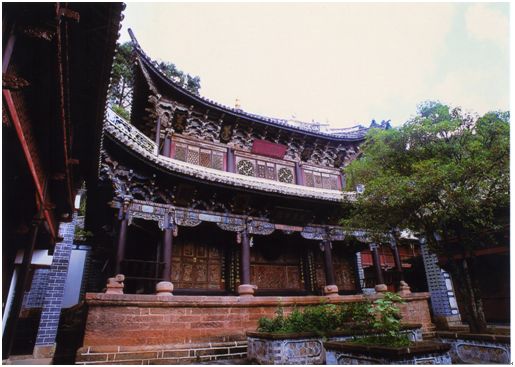
Dali Zhoucheng Wenmiao He Wumiao.
-
Dali Ancient Town Boutique Inn: Nestled in the heart of Dali’s ancient town, this boutique inn blends traditional Bai architecture with modern comforts. Guests can enjoy cozy rooms, a lovely courtyard, and easy access to local attractions.
-
Erhai Lake Homestays: For a more tranquil experience, consider staying at one of the homestays along the shores of Erhai Lake. Yuxiang Homestay offers stunning lake views, delicious home-cooked meals, and a peaceful atmosphere ideal for relaxation.
-
Dali Garden Hotel: This hotel is known for its excellent service and beautiful gardens. Located close to major attractions, it provides a comfortable stay with amenities like free Wi-Fi and a restaurant serving local cuisine.
-
Wumiao Hotel: Situated near the temples, this hotel offers convenient access to cultural sites. It features modern rooms, a breakfast buffet, and a terrace with views of the surrounding landscape.
-
Hostels: For budget travelers, hostels like Dali Cloud Hostels provide dormitory-style accommodations with a vibrant social atmosphere. They often organize group activities, making it easy to meet fellow travelers.
Whether you’re enjoying a warm bowl of rice noodles or retreating to a quaint inn after a day of exploration, Dali Zhoucheng Wenmiao and Wumiao promise a memorable experience filled with delicious food and comfortable stays.
Frequently Asked Questions
Frequently Asked Questions about Dali Zhoucheng Wenmiao He Wumiao
- What are the opening hours for the Dali Zhoucheng Wenmiao and Wumiao?
-
The specific opening hours can vary, so it’s best to contact the site directly for confirmation before your visit. Generally, you can expect standard hours during the day, but checking ahead is recommended.
-
Is there an admission fee to visit the Wenmiao and Wumiao?
-
Yes, there is usually an admission fee to visit these historical sites. For the latest fee information, it’s advisable to check online or inquire locally as prices may change.
-
How do I get to Dali Zhoucheng Wenmiao and Wumiao?
-
The temples are located in Zhoucheng Town, which is accessible by public transport or taxi from Dali Ancient Town. Renting a bike or using a ride-hailing app can also be convenient options.
-
Are there guided tours available for the Wenmiao and Wumiao?
-
Yes, guided tours are often available, providing valuable insights into the history and significance of the temples. Check with local tour operators or your accommodation for options.
-
What is the best time to visit Dali Zhoucheng Wenmiao and Wumiao?
-
The best time to visit is during the spring and autumn months (March to April and September to October) when the weather is pleasant. Early mornings or late afternoons can provide a quieter experience.
-
Can I take photographs inside the temples?
-
Generally, photography is allowed, but be respectful of any signs indicating restrictions, especially in areas designated for worship. Always ask for permission if you’re unsure.
-
Are there nearby attractions I can visit after the Wenmiao and Wumiao?
-
Yes, nearby attractions include the Cangshan Mountain, Erhai Lake, and the Dali Ancient Town. You can plan a full day of exploration by visiting these sites in close proximity.
-
What facilities are available at the Wenmiao and Wumiao?
- Facilities may include restrooms and informational signage. However, amenities may be limited, so it’s a good idea to bring any necessary supplies, such as water or snacks, especially if you plan to spend an extended period there.
Final Thoughts on Your Trip
As you conclude your journey through Dali’s Zhoucheng Wenmiao and Wumiao, take a moment to absorb the rich tapestry of history and culture that envelops these sacred sites. The tranquil atmosphere and stunning architecture offer a unique glimpse into the traditions that have shaped this enchanting region. Whether you marvel at the intricate carvings or reflect in the serene courtyards, these temples serve as a reminder of the profound wisdom of Confucius and the valor of martial traditions.
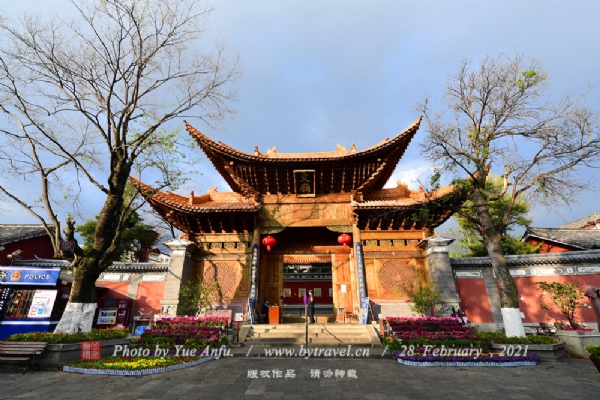
Dali Zhoucheng Wenmiao He Wumiao.
Embrace the spirit of Dali, where every corner tells a story and every visit deepens your understanding of its cultural heritage. As you depart, carry with you the echoes of ancient teachings and the vibrant essence of local life, promising to return one day to uncover more of this captivating landscape. Let the memories of Zhoucheng Wenmiao and Wumiao inspire your future travels, igniting a passion for exploration and appreciation of the world’s diverse cultures.
